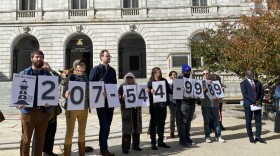The legalization of cannabis in Massachusetts and other states has added to a shortage of drivers licensed to operate snowplows, tractor-trailers and other heavy equipment. That's the gist of a recent article in The Republican newspaper. The Springfield paper looked at how the lack of operators with commercial drivers licenses — or CDLs — hampered snow removals efforts in Springfield this past winter.
The city needed 150 plow operators, according to reporter Jeanette DeForge — but had fewer than 90. And a major reason for that shortage, she reported: required drug testing.
Jeanette DeForge, The Republican: Everyone who has a CDL faces federal random drug testing, and one of the things they test for is cannabis. The problem. of course, in Massachusetts and I believe it's 24 other states, is that it's legal. And as one business owner said, it's everywhere. People use it for sleep aids, to party, people use it for all types of reasons. People use as medication as well.
Kari Njiiri, NEPM: And the penalties, though, for failing a federal drug test?
DeForge: They're actually fairly strict. You lose your license for a while. I believe it's maybe 45 days, and you also have to test negative to get your license back. And you have to go through counseling. And testing negative can take a long time, because cannabis can stay in your system for up to maybe 100 days.
It's not like a breathalyzer, for example. And there's problems with breathalyzers, too, as we have written about. But a breathalyzer ideally shows your impairment at that exact second, where the cannabis test does not. So it's a very inexact test.
So the shortage of drivers with commercial driver's licenses goes beyond Springfield?
Absolutely. It is a national problem. In talking to one of the businesses, who has a tow truck company that uses a lot, has a lot of heavy equipment. He said a lot of people will come in when they hear the drug testing requirements. They leave. They don't even continue with the interview. [State] Sen. Adam Gomez from Springfield was saying you pretty much cannot smoke or ingest weed if you want to be a CDL driver.
What about other lawmakers on the federal level — since this is a federal issue now?
It is becoming a federal issue. And when I was talking to the federal Department of Transportation, they acknowledged there was a shortage. They did not acknowledge that it was because of cannabis. Their answer was getting more people into training. When I asked our own federal lawmakers, they pretty much said it just wasn't on the radar screen — changing the law was not on the radar screen.
So is there a solution?
It's a good question. Your solution could be to not test randomly for cannabis use. Your solution could be to find a better test. I'm sure there's research being done. There should be if there isn't, to find a better test that accurately shows if people are actually impaired at that point.
But there may be other ideas, as well. But the complexity of it requires a change in federal law ... federal supersedes state law.
Given the relatively mild winter we had this past season, it seems like municipalities dodged the proverbial bullet. How are they planning for next winter?
I'm not sure they're doing it now, but even last year they did all kinds of things to try to recruit drivers. They offered companies — usually they'll use construction companies who aren't working during the winter — they offered them incentives.
What kind of incentives are we talking about?
Well, for example, in Springfield, if they can hire somebody, they will actually pay for CDL training, which can be, I think, approximately $5,000 to $7,000. They had a sign-on bonus. It was a new thing this year, and I don't remember how much it was. But for companies who sign on, they will give them a bonus at the end of the year if they show up basically for every storm.
So there were a couple of things like that. Everyone's raised the rates. And that is a problem too, is simply it's getting more and more expensive to do this because everyone's competing with each other. So Springfield's competing with Chicopee. Chicopee is competing with Holyoke and so on and so forth.







